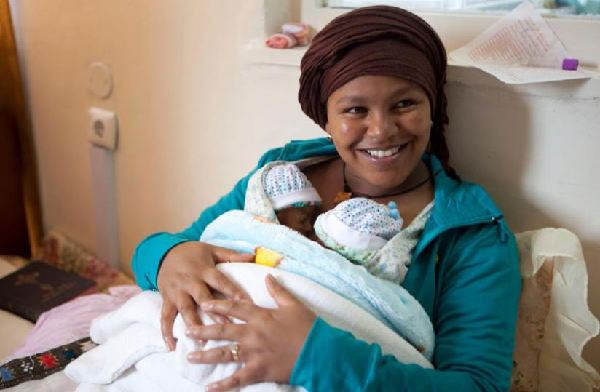
Saving preterm babies through Kangaroo Mother Care: the way to go
Globally, it is estimated that about 15 million babies are born preterm annually with over one million dying as a result of complications.
Health professionals say complications of prematurity and low birth weight are among the leading causes of neonatal deaths worldwide.
Advertisement
A preterm birth is defined as a baby born alive before 37 weeks of pregnancy are completed. Prematurity, according to health workers, is the single largest cause of all under-five deaths across the globe.
According to some research, many preterm survivors face a lifetime of disability, including learning disabilities and visual and hearing problems.
Preterm babies are highly susceptible to difficulty in breathing and infections which are significant threats to their lives.
The United Nations Children's Fund (UNICEF-Ghana) report of 2016 says prematurity kills more than 8000 babies in Ghana annually.
Efforts
As part of strategies to deal with the preterm issues in the country, the Ghana Health Service (GHS), UNICEF and the Bill and Melinda Gates Foundation in collaboration with CSOs and development partners have intensified efforts to promote Kangaroo Mother Care (KMC) initiative to improve newborn care across health facilities in the country.
The Rural Initiatives for Self-Empowerment (RISE-Ghana) is one of the NGOs complementing the efforts of the Regional Health Directorate to implement the KMC initiative in the Kassena-Nankana West District in the Upper East Region.
The Kangaroo care or KMC, sometimes called skin-to-skin care, is a technique of newborn care where babies are kept skin-to-skin with a parent, typically their mother. It is a kind of care for preterm infants by carrying them skin-to-skin on the mothers chest and exclusively breastfeeding them.

Some mothers giving Kangaroo care to their babies
According to UNICEF, KMC significantly reduces complications due to prematurity such as hypothermia (low body temperature) and reduces the risk of death by 50 per cent.
In November 2015, the World Health Organization (WHO) recommended caring of preterm infants using Kangaroo Mother Care (KMC).
World Kangaroo Mother Care, which is marked on May 15, is therefore commemorated annually to raise awareness of the importance of the KMC to newborn care.
The KMC initiative has been found to be effective in all health care facilities, particularly in both low- and middle-income countries.
MBFHI
The KMC falls under the implementation of the Mother-Baby-Friendly Health Facility Initiatives (MBFHI) project, aimed at reducing infant and neonatal deaths.
The MBFHI is being piloted in four districts in the Upper East region, including the Kassena-Nankana West, the Bongo, Bawku and the Bolgatanga Municipality.
Benefits
The Executive Director of RISE-Ghana, Mr Awal Ahmed Kariyama, in an interview said "this low-cost, low-tech and evidence-based method (KMC) has proven to reduce neonatal mortality to up to 33 per cent in low-income countries".
He said however that uptake of the concept "remains low due to ignorance, limited advocacy and the lack of specific coordinated sustained action to ensure adoption by mothers who need it".
“KMC can reduce child and neonatal mortality through early initiation of breastfeeding by 1.5 million deaths annually globally,” Mr Awal said, calling for the incorporation of KMC into pre-service and in-service curricula for all health workers who care for newborns to increase understanding of proper KMC implementation.
"Health workers and professional associations should accept and promote KMC for its accelerated use to save newborn lives and improve outcomes globally," he said.

A mother giving Kangaroo care to a baby
He explained that early initiation of KMC has been proven to contribute to the reduction of infection-related mortality by 45 per cent and mortality by 42 per cent among low birth weight babies.
Mr Awal has therefore called on health workers, in particular, to contribute to the promotion and integration of the KMC concept in health facilities.
Expert views
For her part, a Pediatrician Specialist at the Dormaa Presbyterian Hospital, Dr Adoma Dwomo Fokuo, said when the baby is in the KMC position, it helps to regulate the baby’s breathing.
She explained that “tiny babies often forget to breathe and the mother's breathing and heartbeat stimulate him to continue breathing,” adding that it also helps in breastfeeding.
According to her, the preterm baby in a KMC position “stimulates the production of milk” and the mother gets more breast milk for the baby”, which she said is critical for the baby’s survival.
Dr Fokuo said the warmth of the mother keeps the baby warm and as such, the baby “is able to grow well”, noting that the calmness of been at the KMC position “helps the baby relax, sleep and his brain develops well”.
Additionally, the pediatrician specialist explained that the KMC prevents infections as baby is colonised by his mother’s normal flora and that since he is not put in an incubator or a cot shared by others babies, he is safe from contracting any disease from the hospital.
She added that the KMC helps to improve better growth and weight gain and also creates bonding between the baby and the mother.
Dr Fokuo explained that the KMC is a very cost-effective method that requires less staff and inexpensive equipment, hence benefiting health facilities where it is practised.



